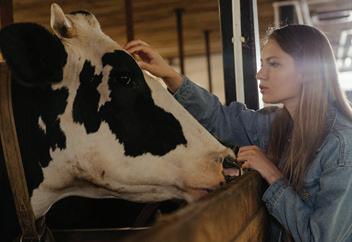
2 minute read
James Hutton Institute
Treble success on the PGRO descriptive list for Limagrain beans & peas
Yield performance – that is yield and consistency - is the most important factor for spring beans and is a major focus in the Limagrain breeding programme and this can be seen in our spring bean additions to the DL this year,” notes Will Pillinger, pulse breeder at Limagrain UK.
Advertisement
“LG Raptor offers extremely high yield potential at 102% of control, and importantly has shown a consistency in these yields over the last few years, which is a really important and valuable attribute for a spring bean,” he says.
“But high yields need to be backed up by solid agronomics and traits - and LG Raptor offers all of this - it is fairly early to mature, stands well and offers a good disease package including rust.”
“LG Raptor is suitable for human consumption, fish feed and animal protein markets so offers a range of marketing opportunities.”
Tom Barker, pulses product manager for Limagrain, says.” LG Raptor’s consistent yields and disease resistance package mean it will be taking a big bite into the spring bean acreage – particularly in the north with its particular combination of traits.”
“LG Viper is our second spring bean to fully join the DL and a really exciting spring bean variety that offers a class leading disease package backed up by Limagrain’s comprehensive, extensive and reliable dataset,” says Mr Pillinger.
Study shows impact of Covid-19 on women in agriculture
New research by the James Hutton Institute has found that the shift to virtual meetings and events due to the Covid-19 pandemic improved accessibility to knowledge exchange, networking, and organisations for women working on farms and in agricultural careers across Scotland. The virtual shift also saved time on travel and prevented childcare difficulties.
The research found the pandemic also provided a ‘legitimising’ window of opportunity for greater female involvement in some farming and crofting activities.
However, female focus group participants explained that home-schooling children impacted on their ability to do their jobs, maintain productivity and that it kept them from participating in some on-farm activities. Women also reported safety issues related to caring for children while completing farm tasks, and the impact of the pandemic on children and young people was a concern.
Dr Lee-Ann Sutherland, a research leader at the James Hutton Institute and co-author of the report, said: “The experience of Covid-19 movement restrictions has shown that there are quite achievable ways to ensure that women can participate in more agricultural industry activities. It’s important to the vitality of the agricultural sector that these lessons are taken forward into the future.”
The work was funded by the Scottish Government, and Cabinet Secretary for Rural Affairs and Islands Mairi Gougeon commented: “I’m delighted that the focus and investment that this government has provided for this key area of work appears to be reaping rewards.
“Delivering equality of opportunity will make Scottish agriculture a more resilient and economically sustainable industry and this will help women realise their potential and support business innovation.”
The report highlights the ongoing importance of overcoming barriers to gender equality and wider diversity in Scottish agriculture, and the value to the future of the industry, ensuring the participation of those from non-farming backgrounds, different ethnic and cultural backgrounds.
The full research report, titled ‘The Changing Role of Women in Farming, Crofting, and the Agricultural Industry: 2016-2021’, can be found at https://www.hutton.ac.uk/ WIA2021study.











